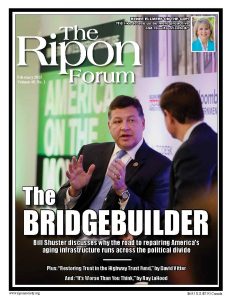WASHINGTON, DC – With a short-term highway funding bill set to expire at the end of May, the latest edition of THE RIPON FORUM looks at the importance of rebuilding America’s aging infrastructure and the effort to craft a bipartisan agreement on Capitol Hill.

The effort is being led by Congressman Bill Shuster (PA-9). Shuster serves as Chairman of the House Transportation and Infrastructure Committee. In an interview with the FORUM, he explains why investing in better roads and bridges makes good economic sense. “Ten percent of a product’s total cost can be attributed to transportation,” Shuster states, “so when the system is inefficient, we all pay more for the goods we rely on every day.”
The Pennsylvania lawmaker also discusses the political realities of passing a long-funding bill and why he is committed to working across the partisan divide to get the job done. “Building bridges is an apt description of what it takes to pass a major surface transportation bill,” he observes. “I believe trying to build consensus is the right thing to do, but it’s also the practical thing to do. There’s simply much more we can accomplish for the good of our infrastructure and our economy when we work together.”
The latest edition of the FORUM also features an essay by Senator David Vitter (R-LA), who Chairs the Subcommittee on Transportation and Infrastructure and shares Shuster’s sense of urgency about the importance of reaching agreement on a long-term plan. “While short-term fixes have allowed the trust fund to continue operating,” the Louisiana Republican writes, “taxpayers continue to drive on deteriorating roads and bridges wondering where their taxpayer dollars have gone.”
This viewpoint is echoed by Ray LaHood. In an essay for the FORUM, the former Congressman and Transportation Secretary writes about the “deplorable state” of America’s infrastructure and what it is costing American taxpayers each year. “Because 32 percent of major roads are in poor or mediocre condition,” he pens, “taxpayers are paying on average $444 each year in additional vehicle repairs and operating costs … And because 44 percent of America’s major urban highways are congested, drivers are paying $121 billion in wasted time and fuel.”
Other authors and essays featured in the latest edition of THE RIPON FORUM include:
- Adrian Moore of the Reason Foundation – who examines the possibility of adopting a mileage-based user fee as a new source of revenue for the Highway Trust Fund and argues it is something that should be considered;
- Gary Biller of the National Motorists Association – who also examines the possibility of adopting a mileage-based user fee and argues that the cost to American drivers may be too high;
- Jonathan L. Gifford of George Mason University – who examines the growing importance of Public-Private Partnerships in transportation projects around the country; and,
- Joshua Schank of the Eno Center for Transportation – who examines our nation’s transportation priorities and concludes that they are misguided.
The latest edition of the FORUM also features a timely essay by Thomas E. Garrett of the International Republican Institute, who examines the growing number of young people around the world and the impact of this “youth bulge” on U.S. foreign policy. With THE RIPON FORUM marking its 50th anniversary of publication in 2015, FORUM Editor Lou Zickar looks back over the last half-century at some of the individuals and ideas that have been featured in the journal’s pages.
And in the latest Ripon Profile, North Carolina Congresswoman Renee Ellmers discusses the toughest and most rewarding parts of her job, and her priorities over the next two years.
THE RIPON FORUM is published by The Ripon Society, a public policy organization that was founded in 1962 and takes its name from the town where the Republican Party was born in 1854 – Ripon, Wisconsin. One of the main goals of The Ripon Society is to promote the ideas and principles that have made America great and contributed to the GOP’s success. These ideas include keeping our nation secure, keeping taxes low and having a federal government that is smaller, smarter and more accountable to the people.




